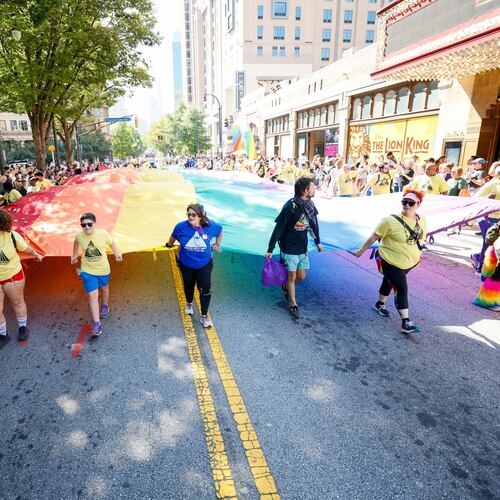There were tears, hugs, prayer and singing in Charlotte after the United Methodist Church removed a line prohibiting the ordination of LGBTQ clergy that had been in place since 1984.
According to United Methodist News, delegates - without debate - voted 692 to 51 for the changes on the day’s consent calendar, which enabled the lawmaking assembly to approve several pieces of legislation in bulk.
The historic vote moves the denomination, with its 10 million members, within a hair’s breadth from being fully accepting of the LGBTQ community.
Last week, delegates approved a regionalization plan that allowed for geographic regions including North America, Europe Africa and the Philippines to set their own rules on different issues - such as LGBTQ clergy - based on culture and context.
“It is time,” said the Rev. Brett Brett M. Opalinski, assistant dean of Methodist Studies at the Emory University’s Candler School of Theology and a delegate from a Florida conference. “So many have worked, fought and lost so many things, So many that God has called and claimed have been denied and turned away. So many allies have been rejected by churches and lost friendships.”
The morning action also removed a ban on annual conferences and denominational agencies from giving United Methodist funds to any “gay caucus group” or using funds to “promote the acceptance of homosexuality.”
Instead, according to United Methodist News, the provision now says annual conferences and agencies should honor the denomination’s commitment not to reject lesbian or gay members.
Other items approved, according to UM News, include:
- Erase the mandatory penalty of at least a one-year suspension without pay for clergy found guilty of officiating at same-sex weddings or unions. This was the denomination’s only chargeable offense with a mandatory penalty.
- Allow gay clergy in good standing to be appointed across annual conference lines when their bishop can’t locate an appointment in their conference.
- Set a moratorium on judicial proceedings related to the denomination’s bans against “self-avowed practicing” gay clergy and same-sex weddings.
The meeting of the denomination’s top legislative body was to be held in 2020, but was delayed because of the pandemic. As many as 7,500 people were expected to attend from around the world.
Bishop Robin Dease, released a message to members of the North Georgia United Methodist Church, which covers an area north of Macon.
She said as a bishop it was hard not to be moved by the spiritual and emotional implications of what was happening.
“As you look at the voting, and the decisions being made, these delegates from all over the world are harbingers of a new expression of United Methodism,” she wrote. “They desire to be a connectional church. They want to move forward. They want to be the Church.”
The pain and angst has been great in the global Church, which has debated issues around human sexuality for decades. The denomination has lost about a quarter of its churches. The majority of those churches tended to be the most conservative.
Since 2022, more than 330 churches have left the UMC’s North Georgia Conference. That represents about 38% of the conference’s churches and 27% of its members.
Today, the conference has about 440 churches remaining — but nearly a dozen new congregations are forming.
The smaller South Georgia Conference of the UMC has lost about half of the congregations since 2020, according to spokeswoman Kelly Roberson.
The South Georgia Conference, which includes the area of the southern part of the state currently has 274 congregations, which includes established churches, missional congregations, and new church starts.
“We’re trying to live up to our better self. God is working through us to prepare a more expansive table,” Dease said. “The church is not perfect. We will continue to have challenges; we will continue to make decisions and reconsider those decisions. This is why we have General Conferences—because the work of hope and justice and grace is never done! The image of God dwells in every human being and that is why we work towards inclusion. "
She added there was no move to force the local church or clergy to do anything they are not prepared or willing to do.
The legislation approved this morning also explicitly protects the right of clergy and churches not to officiate at or host same-sex weddings, according to North Georgia spokeswoman Sybil Davidson.
Reaction was swift for United Methodists who were in Charlotte and those who followed on livestream and via texts and calls with friends and colleagues there.
“Hallelu!!,” said the Rev. Josh Noblitt , who for 17 years, served as one of the pastors at St. Mark United Methodist Church on Peachtree Street in Atlanta.
Noblitt was ordained in 2007. At the time, he said, his ordination as clergy was more of a “don’t ask, don’t tell” situation.
Yet, during that time, the doctrine of the denomination he loves didn’t fully welcome him as a gay man.
“It is such a relief. It feels like we can move forward in a way that everybody has a seat at the table,” he said. “Those of us in the Methodist tradition who are also LGBTQ were willing to be in fellowship with them but they felt like they couldn’t stomach being in fellowship with us. It’s sad because we’re all God’s family,” Noblitt said.
The Rev. Beth LaRocca Pitts, who is a delegate in Charlotte and is senior pastor of Oak Grove United Methodist Church in Decatur, called it a “great blessing” for the changes.
“Methodists LGBTQIA person who feel the call of God upon their hearts for ministry may now answer that call in their home church and need not leave us for other denominations,” she said.
Could there be more disaffiliations in the future?
Perhaps, experts say.
If so, the numbers will be much smaller.
The most conservative churches left over the last few years.
About the Author
Keep Reading
The Latest
Featured


